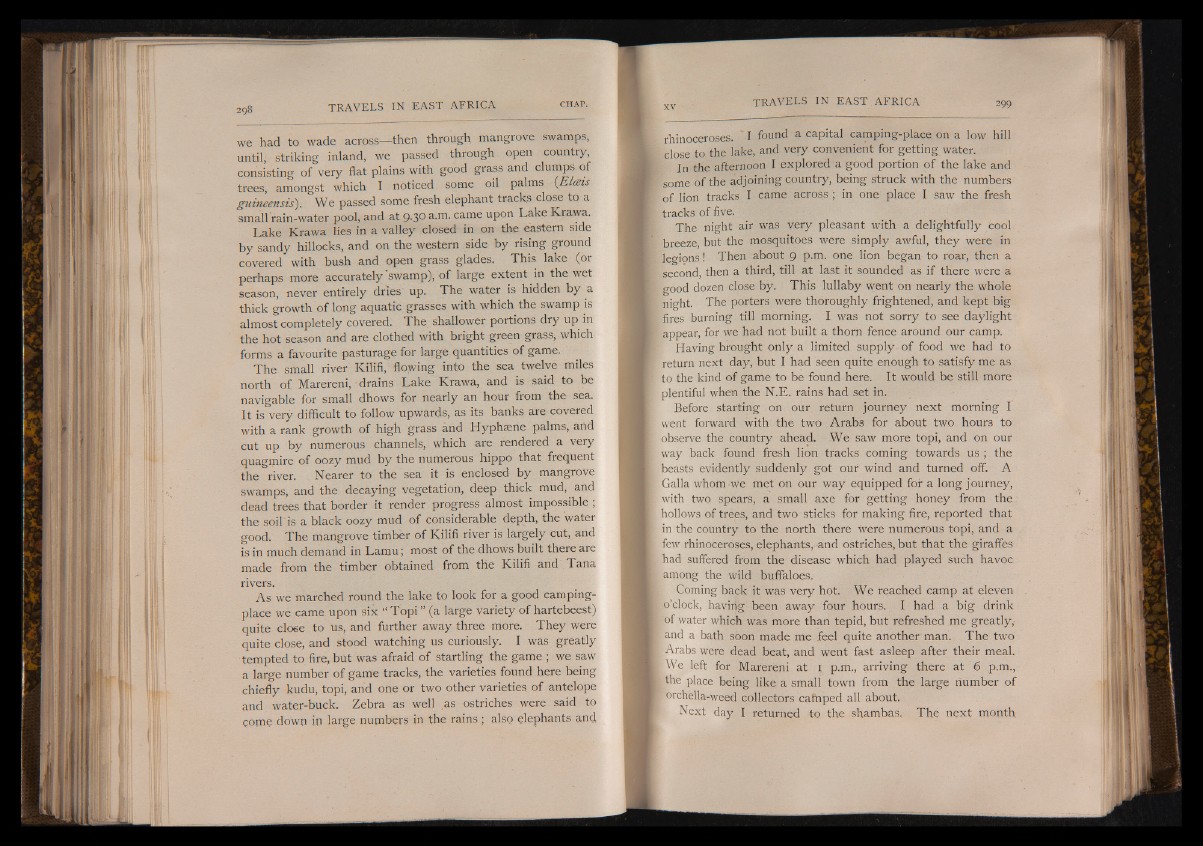
we had to wade across— then through mangrove swamps,
until, striking inland, we passed through open country,
consisting of very flat plains with good grass and clumps of
trees, amongst which I noticed some oil palms (Elms
guineensis). We passed some fresh elephant tracks close to a
small rain-water pool, and at 9.30 a.m. came upon Lake Krawa.
Lake Krawa lies in a valley closed in on the eastern side
by sandy hillocks, and on the western side by rising ground
covered with bush and open grass glades. This lake (or
perhaps more accurately swamp), of large extent in the wet
season, never entirely dries up. The water is hidden by a
thick growth of long aquatic grasses with which the swamp is
almost completely covered. The shallower portions dry up in
the hot season and are clothed with bright green grass, which
forms a favourite pasturage for large quantities of game.
The small river Kilifi, flowing into the sea twelve miles
north of Marereni, drains Lake Krawa, and is said to be
navigable for small dhows for nearly an hour from the sea.
It is very difficult to follow upwards, as its banks are covered
with a rank growth of high grass and Hyphaene palms, and
cut up by numerous channels, which are rendered a very
quagmire of oozy mud by the numerous hippo that frequent
the river. Nearer to the sea it is enclosed by mangrove
swamps, and the decaying vegetation, deep thick mud, and
dead trees that border it render progress almost impossible ;
the soil is a black oozy mud of considerable depth, the water
good. The mangrove timber of Kilifi river is largely cut, and
is in much demand in Lamu; most of the dhows built there are
made from the timber obtained from the Kilifi and Tana
rivets.
As we marched round the lake to look for a good camping-
place we came upon six “ T o p i” (a large variety of hartebeest)
quite close to us, and further away three more. They were
quite close, and stood watching us curiously. I was greatly
tempted to fire, but was afraid of startling the game ; we saw
a large number of game tracks, the varieties found here being
chiefly kudu, topi, and one or two other varieties of antelope
and water-buck. Zebra as well as ostriches were said to
come down ip large nupibers in the rains; also elephants and
rhinoceroses. I found a capital camping-place on a low hill
close to the lake, and very convenient for getting water.
In the afternoon I explored a good portion of the lake and
some of the adjoining country, being struck with the numbers
of lion tracks I came across ; in one place I saw the fresh
tracks of five.
The night air was very pleasant with a delightfully cool
breeze but the mosquitoes were simply awful, they were in
legions! Then about 9 p.m. one lion began to roar, then a
second, then a third, till at last it sounded as if there were a
good dozen close by. This lullaby went on nearly the whole
night. The porters were thoroughly frightened, and kept big
fires burning till morning. I was not sorry to see daylight
appear, for we had not built a thorn fence around our camp.
Having brought only a limited supply of food we had to
return next day, but I had seen quite enough to satisfy me as
to the kind of game to be found here. It would be still more
plentiful when the N.E. rains had set in.
Before starting on our return journey next morning I
went forward with the two Arabs for about two hours to
observe the country ahead. We saw more topi, and on our
way back found fresh lion tracks coming towards us ; the
beasts evidently suddenly got our wind and turned off. A
Galla whom we met on our way equipped for a long journey,
with two spears, a small axe for getting honey from the
hollows of trees, and two sticks for making fire, reported that
in the country to the north there were numerous topi, and a
few rhinoceroses, elephants, and ostriches, but that the giraffes
had suffered from the disease which had played such havoc
among the wild buffaloes.
Coming back it was very hot. We reached camp at eleven
. o’clock, having been away four hours. I had a big drink
(of water which was more than tepid, but refreshed me greatly,
and a bath soon made me feel quite another man. The two
I Arabs were dead beat, and went fast asleep after their meal.
I We left for Marereni at 1 p.m., arriving there at 6 p.m.,
L the place being like a small town from the large number of
l orchella-weed collectors cafnped all about.
Next day I returned to the shambas, The next month